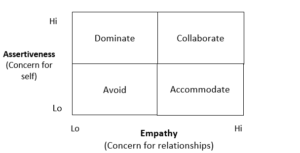I’ve written a lot of articles, in the last several months, about how to create a happy and loving marriage or relationship with your life partner. A common theme throughout has been the importance of doing things, intentionally and proactively, to foster a climate of positive rather than negative sentiment. Sure, there will always be conflict and hard times. But the bottom line is that marriages thrive as couples nurture mutual respect and friendship.
The Role of Communication
Now I want to transition to the topic of connection and communication in marriage. Although friendship is the foundation of a great marriage, communication matters. In fact, if you think back to the five stages of marriage, good communication is crucial to achieving mature love, the final and highest stage of marriage.
Of course, there are lots of levels of communication. In fact, you’re always communicating, be it verbal or nonverbal. You cannot not communicate in the presence of another human being. You put out nonverbal cues. You engage in surface chit-chat. You exchange opinions and information. All of these are valid and useful forms of communication. They all have their place.
However, I want to go deeper. In the most loving relationships, partners are there for each other. They are attuned, accessible, and responsive to one another’s needs and feelings. It is through their honest and vulnerable communication as well as empathy and compassion that they reach the deepest levels of love and intimacy.
To Make Common
If you look in the dictionary, the most basic definition of the word “communicate” is “to make common.” It is to share your inner experience (wants, needs, feelings, and perceptions) with another person.
When you look at it this way, the word is spiritual in origin; its root is “commune.” The most important communication is soul-to-soul, spirit-to-spirit, heart-to-heart. It requires that we view another not as an object or “it” but rather as a “thou,” a real human being with valid perceptions, needs, wants and feelings.
My intent, in my next few blog posts, is to offer you some ideas to help you communicate in ways that bring greater depth, intimacy, and security to your relationship. I want to do this by helping you increase your authenticity and compassion in your communication so you can be more present, emotionally connected, and secure.
A Model of Communication
However, in this post, I need to take a step back. I want to share four styles of communication to help you not only understand your marriage but improve how you communicate and create a more secure connection with one another.
Here’s a diagram (sorry for the small size).
Notice that there are two dimensions. One dimension is called assertiveness which has to do with concern for yourself, your needs, and interests. A spouse who is high on this dimension is good at taking care of her own needs or standing up for her own rights or point of view.
The second dimension, along the bottom axis, is empathy which is concern for others. A spouse high on empathy is sensitive to the needs, opinions, and feelings of her spouse. She wants to hear her partner’s opinions, support them in what is important to them and take these opinions into account when making decisions.
Four Styles
By combining these two dimensions we come up with four styles of communication in marriage: dominate, avoid, accommodate, and collaborate. Let me be clear that you can fall anywhere along either dimension of the model and so not everyone is a “pure” or extreme type. However, you and your spouse can be characterized as having natural tendencies in one or another of the four quadrants.
Notice, from the chart, that when we dominate, we are high on assertiveness and low on empathy. When we accommodate, we are high on empathy and low on assertiveness. When we avoid, we are low on both assertiveness and empathy. When we collaborate, we are high on both assertiveness and empathy. We are good at taking care of our own needs and good at helping others meet their needs as well.
I want to point out that sometimes it’s hard to see the styles in our day-to-day conversations when everything is going smoothly. The styles become most apparent during disagreements or conflicts when emotions are aroused, and people see things differently.
So let’s look at the four styles in a little greater depth.
Dominators
Dominators assert their own needs and opinions. They express themselves openly and seek what they want. Since they are high on assertiveness and low on empathy, they have less regard for how their opinions or needs might affect their partners. During conflict they handle their emotions by defending, arguing, lecturing, blaming, or maybe even attacking.
Dominators don’t like to be wrong, and they don’t like to lose. Their strategy is to convince, control or even coerce other people into thinking, doing, or believing what they want.
They tend to say or imply things like:
- “You must (should, ought to, better)”
- “My way or the highway”
- “You always/never”
- “That’s dumb”
- “Why don’t you”
- “You ought to know better than that”
Accommodators
Accommodators, on the other hand, are high on empathy and low on assertiveness and so they tend to put the opinions, needs and feelings of others ahead of their own. They tend to be polite, easy to get along with, non-judgmental, and more self-aware than dominators or avoiders.
During conflict, they defer to others and even give-in or go along. This means that they stuff their own feelings and wants rather than getting them out in the open. They’re more likely to become silent rather than express themselves openly.
Accommodators don’t want to offend. They want others to be happy. They hope that by being nice they can not only avoid rejection and criticism of themselves, but influence others go along or even come around to their point of view.
Over time, accommodators may feel like martyrs, and, since they can’t be upfront and clear about their own needs, may act out their feelings in passive-aggressive ways—by withholding or getting even. They communicate messages like:
- “What do you want?”
- “I want you to feel good about this”
- “It doesn’t matter to me”
- “I may be wrong, but”
- “Is that okay with you?”
- “Let’s try to get along”
- “What do you need?”
Avoiders
A third style is avoiding. Avoiders are low on both dimensions of assertiveness and empathy. They tend to minimize differences. Avoiding behaviors include denying the seriousness of a situation, suppressing their feelings, using humor, minimizing, being apathetic, rationalizing, acting as if it’s “business as usual,” distracting, dismissing, escaping, etc.
Avoiders don’t like conflict, particularly the strong emotions conflict brings, so they try to pretend that everything is okay. Their strategy is to leave issues alone and hope that they will go away. Because they have a hard time dealing with emotional issues, their relationships aren’t as deep. They don’t disclose their true selves to other people but seek to play it safe. Avoiders tend to be easy going, independent, rational, and detached.
They tend to say things like:
- “It’s no biggie”
- “Let’s not make a mountain out of a mole-hill”
- “What problem?”
- “You’re cute when you’re mad”
- “I said I was sorry”
- “Let’s be logical about this”
Collaborators
A fourth and better style of communication in marriage is collaboration. Collaborators assert their own point of view, needs and so on, and are also able to show empathy for the views and needs of their partner. In other words, they are good at both assertiveness and empathy.
And this is where we want to be, by the way, good at both dimensions. We can be vulnerable enough to assert our own perspective, needs, and feelings in a non-dominant or controlling way. Likewise, we can be sensitive to the perspective, needs, and feelings of our partners and give them space to express themselves fully. Understanding this balance is the essence of good communication and a healthy relationship.
Collaborators tend to say things like:
- This is my point of view. How do you see things?
- What is important to you?
- Is this what I’m hearing you say…
- How can I support you?
- Can I be open with you about my need (something that hurt me)?
Becoming Aware of Your Style
I’ll keep talking about improving and deepening our communication in marriage in upcoming blog posts. In the meantime, I want to invite you to consider your communication. What is your native style? Are you a dominator? An accommodator? An avoider? Perhaps a collaborator? And what are the consequences in your various relationships?
In truth, we use all four styles at different times and in different relationships. Nonetheless, we have a home base, a native dialect. How does your dialect influence your marriage?



I have learnt a lot in this.
Thanks, Bro George. I’m glad.
Thank so much for your insight i have been enlighten
You are welcome, Grace. I’m happy that my insights have been helpful to you.
Thanks, very greatful. God bless and give you more ideas and wisdom
Thank you Jessa. I’m glad you liked this article.
Thank you Roger, this is very good, I have learnt a lot I will use this to help others as well.
Thanks Charles. I’m so glad you have learned from this concept. My best to you as you continue your journey.